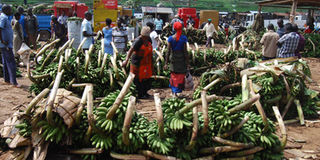Experts scoff at low budget to agriculture

Agriculture. Banana dealers in Ekikoona market in Mbarara District sell matooke. PHOTO BY ALFRED TUMUSHABE
What you need to know:
Stand. Leaders say argue that without adequate funding in Agriculture, the country’s food security cannot be guaranteed
Uganda and its sister East African countries are today reading their national budgets for 2019/2020 with Uganda allocating Shs40.5 trillion to run the country.
Agriculture, which is considered the backbone of Uganda’s economy employing more than 70 per cent of the population, has been allocated Shs1 trillion. However, this falls far below the Malabo Protocol where African countries committed to allocate 10 per cent of their national budgets to agricultural investment and adoption of improved technologies for growth of countries’ economies.
Agriculture ministry strategy
The Ministry of Agriculture, Animal Industry and Fisheries, in its statement about the budget stated: “In the 2019/2020 financial year, government will continue to prioritise investments aimed at increasing production and productivity, increasing access to critical farm inputs, improving agricultural markets and value addition of the priority commodities and strengthening the institutional capacity of sector stakeholders”.
The role of extension service
However, the commissioner-in-charge of extension services, Dr Patience Rwamigisa, argues that for the ministry to implement its activities efficiently, extension services are important yet African governments including Uganda have failed to invest in this particular area.
“Countries in sub-Saharan Africa, including Uganda, have failed to embrace agricultural extension services. These countries believe that extension services can be provided by the private sector which is wrong.
“It is not correct for governments to run away from providing manpower on ground to transform the sector into commercial agriculture,” he noted.
He cited sugar companies, which are engaged in farming and providing their own private extension services yet the sugarcane growers are not benefiting because they are being exploited.
He also cited Ethiopia which has recruited 65,000 extension service workers leading to mass production and increased level of agro export products.
“USA has been practising extension service from time in memorial and this has led to overproduction of food volumes and now they have turned the strategy to the health sector to check on obesity levels of their citizens,” Dr Rwamigisa said.
He said farmers have resources which include land, crops, livestock, poultry, and fisheries but need knowledge to turn the resources into wealth.
Dr Rwamigisa suggests that money allocated for the infrastructure sector worth Shs6.4 trillion should have been allocated to agriculture.
He said this would increase revenue earnings which can be used to improve infrastructure without government borrowing money from developed countries.
Dr Rwamigisa said the ministry of Agriculture should be allocated Shs50b to recruit 1,998 extension service workers to add on the 3,827 currently. The target is to recruit 5,000 extension service workers.
Research Initiatives
Dr David Okello Kalule, the programme leader for Groundnut Breeding at the National Semi-Arid Agricultural Resources Research Institute in Serere, said most African countries including Uganda have been notorious in violating the Malabo declaration of 10 per cent budget allocation to agriculture.
He said agricultural research institutes under National Agricultural Research Organisation are not performing as expected due to financial constraints.
He said without adequate funding, the country’s food security cannot be guaranteed due to climate change.
Dr Okello said irrigation technologies are too expensive for the small scale farmers because of high capital investment, since they require serious capital investment.
Most of the activities going on in these institutes are donor-funded and it is a deliberate initiative by NARO for its scientists to write funding proposals for research work to go on.
He said that wit6hiut adequate funding, the country’s food security cannot be guaranteed because the sector is threatened by hazards of climate change.
“The country this year experienced a severe prolonged drought causing double price rise in food items and now we are experiencing cyclone in some parts of the country including neighbouring Tanzania and we are not prepared for this,” he cautioned.
Dr Okello said irrigation technologies are too expensive for the small scale farmers because they require serious capital investment.
Besides, the existing dams and valley tanks require supervision by Ministry of Water and Environment but it lacks funds too.
He cited the irrigation facility at Serere to cater for the 20-acre institute land. He said power costs are too high for the institute.
He urged government to prioritize in agriculture commodity production region by region


